Knowledge Management Strategies at Tata Consultancy Services
VerifiedAdded on 2023/01/13
|12
|3642
|55
Report
AI Summary
This report provides a comprehensive analysis of knowledge management strategies at Tata Consultancy Services (TCS), an Indian multinational IT service and consulting company. The introduction defines knowledge management and its importance in creating value and meeting strategic needs. The main body explores the significance of learning and managing intellectual capital within TCS, analyzes and evaluates its knowledge management initiatives, and examines how organizational learning, communities of practice, organizational culture, and the Web of Participation contribute to TCS's success as a leading knowledge-driven company in Asia. The report discusses the steps involved in knowledge management, including collecting, organizing, summarizing, analyzing, synthesizing, and decision-making. It also delves into intellectual capital, organizational learning, and the Boisot's Knowledge category models. The report critically evaluates the KM initiatives at TCS, highlighting both the benefits, such as improved decision-making and increased customer satisfaction, and the drawbacks, such as the complexity of KM systems and potential mishandling of information. The conclusion summarizes the key findings and emphasizes the role of knowledge management in TCS's growth and competitive advantage.
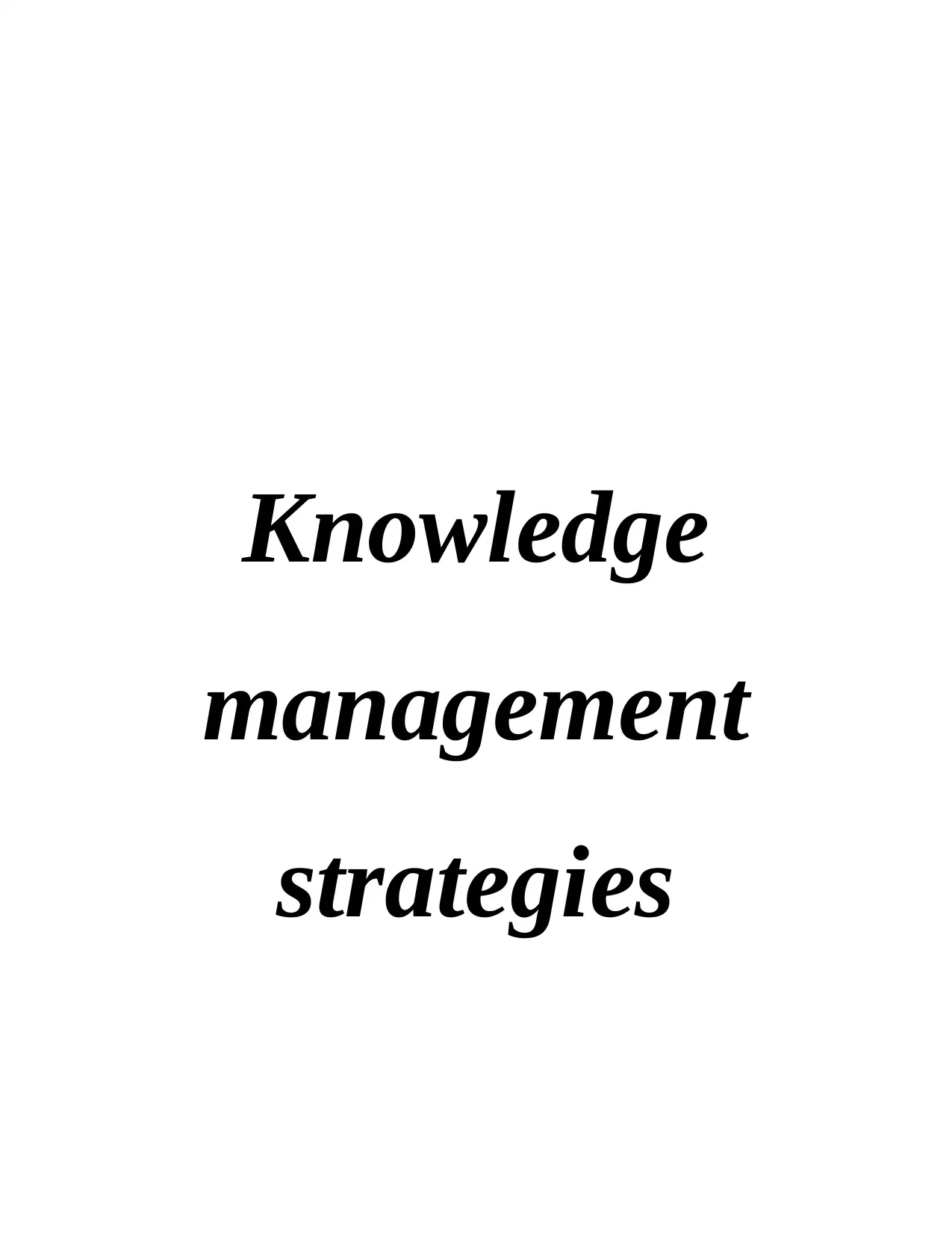
Knowledge
management
strategies
management
strategies
Paraphrase This Document
Need a fresh take? Get an instant paraphrase of this document with our AI Paraphraser
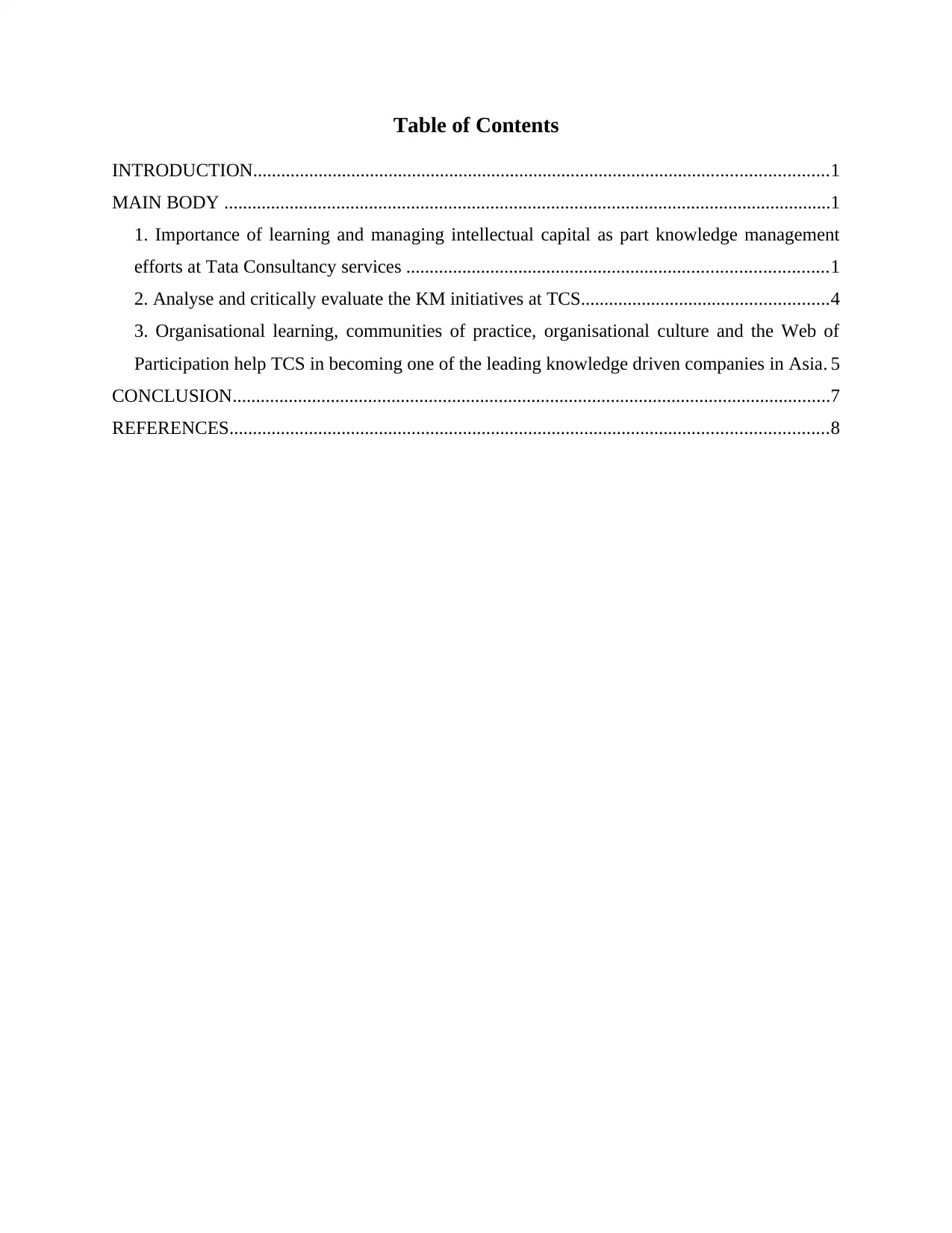
Table of Contents
INTRODUCTION...........................................................................................................................1
MAIN BODY ..................................................................................................................................1
1. Importance of learning and managing intellectual capital as part knowledge management
efforts at Tata Consultancy services ..........................................................................................1
2. Analyse and critically evaluate the KM initiatives at TCS.....................................................4
3. Organisational learning, communities of practice, organisational culture and the Web of
Participation help TCS in becoming one of the leading knowledge driven companies in Asia. 5
CONCLUSION................................................................................................................................7
REFERENCES................................................................................................................................8
INTRODUCTION...........................................................................................................................1
MAIN BODY ..................................................................................................................................1
1. Importance of learning and managing intellectual capital as part knowledge management
efforts at Tata Consultancy services ..........................................................................................1
2. Analyse and critically evaluate the KM initiatives at TCS.....................................................4
3. Organisational learning, communities of practice, organisational culture and the Web of
Participation help TCS in becoming one of the leading knowledge driven companies in Asia. 5
CONCLUSION................................................................................................................................7
REFERENCES................................................................................................................................8
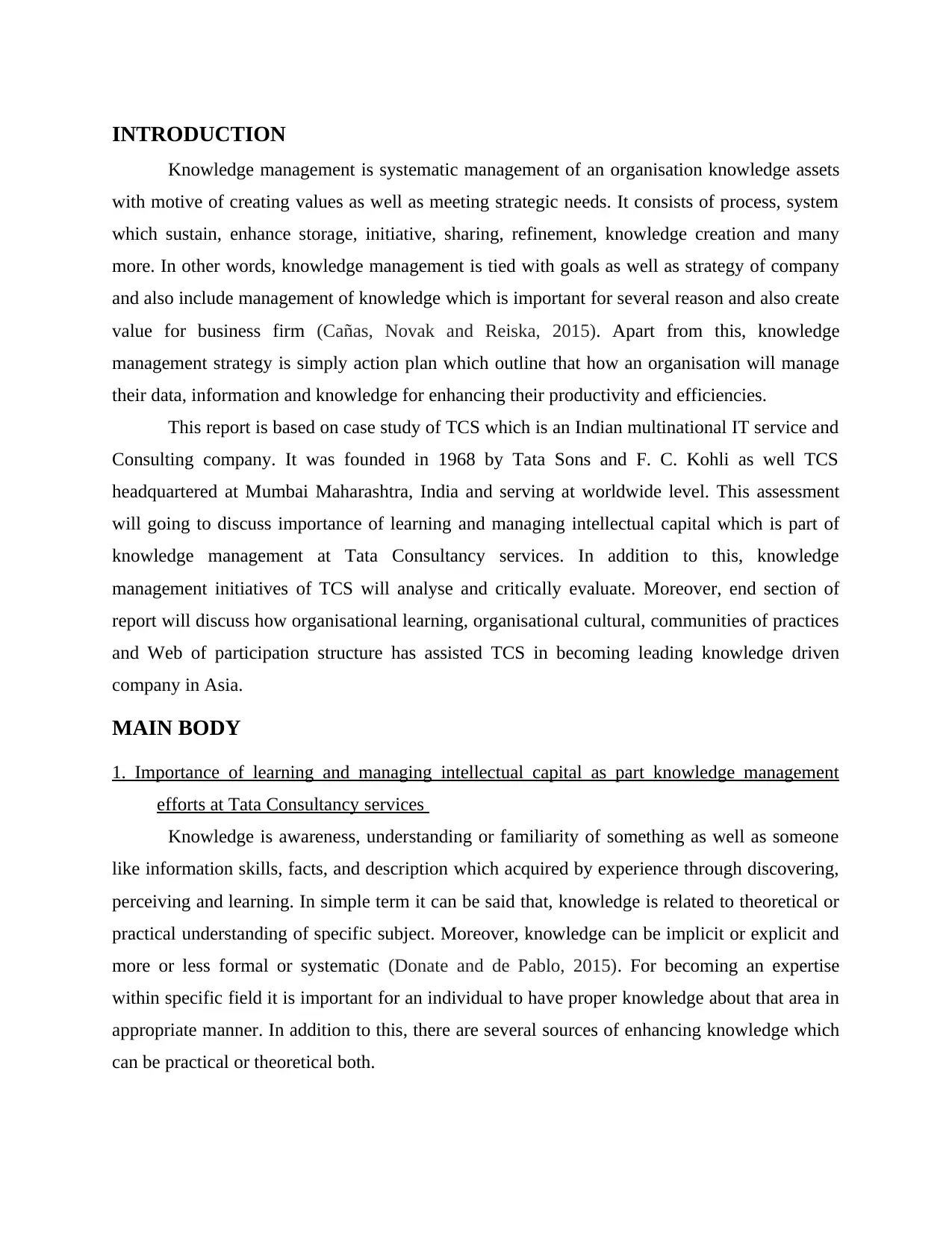
INTRODUCTION
Knowledge management is systematic management of an organisation knowledge assets
with motive of creating values as well as meeting strategic needs. It consists of process, system
which sustain, enhance storage, initiative, sharing, refinement, knowledge creation and many
more. In other words, knowledge management is tied with goals as well as strategy of company
and also include management of knowledge which is important for several reason and also create
value for business firm (Cañas, Novak and Reiska, 2015). Apart from this, knowledge
management strategy is simply action plan which outline that how an organisation will manage
their data, information and knowledge for enhancing their productivity and efficiencies.
This report is based on case study of TCS which is an Indian multinational IT service and
Consulting company. It was founded in 1968 by Tata Sons and F. C. Kohli as well TCS
headquartered at Mumbai Maharashtra, India and serving at worldwide level. This assessment
will going to discuss importance of learning and managing intellectual capital which is part of
knowledge management at Tata Consultancy services. In addition to this, knowledge
management initiatives of TCS will analyse and critically evaluate. Moreover, end section of
report will discuss how organisational learning, organisational cultural, communities of practices
and Web of participation structure has assisted TCS in becoming leading knowledge driven
company in Asia.
MAIN BODY
1. Importance of learning and managing intellectual capital as part knowledge management
efforts at Tata Consultancy services
Knowledge is awareness, understanding or familiarity of something as well as someone
like information skills, facts, and description which acquired by experience through discovering,
perceiving and learning. In simple term it can be said that, knowledge is related to theoretical or
practical understanding of specific subject. Moreover, knowledge can be implicit or explicit and
more or less formal or systematic (Donate and de Pablo, 2015). For becoming an expertise
within specific field it is important for an individual to have proper knowledge about that area in
appropriate manner. In addition to this, there are several sources of enhancing knowledge which
can be practical or theoretical both.
Knowledge management is systematic management of an organisation knowledge assets
with motive of creating values as well as meeting strategic needs. It consists of process, system
which sustain, enhance storage, initiative, sharing, refinement, knowledge creation and many
more. In other words, knowledge management is tied with goals as well as strategy of company
and also include management of knowledge which is important for several reason and also create
value for business firm (Cañas, Novak and Reiska, 2015). Apart from this, knowledge
management strategy is simply action plan which outline that how an organisation will manage
their data, information and knowledge for enhancing their productivity and efficiencies.
This report is based on case study of TCS which is an Indian multinational IT service and
Consulting company. It was founded in 1968 by Tata Sons and F. C. Kohli as well TCS
headquartered at Mumbai Maharashtra, India and serving at worldwide level. This assessment
will going to discuss importance of learning and managing intellectual capital which is part of
knowledge management at Tata Consultancy services. In addition to this, knowledge
management initiatives of TCS will analyse and critically evaluate. Moreover, end section of
report will discuss how organisational learning, organisational cultural, communities of practices
and Web of participation structure has assisted TCS in becoming leading knowledge driven
company in Asia.
MAIN BODY
1. Importance of learning and managing intellectual capital as part knowledge management
efforts at Tata Consultancy services
Knowledge is awareness, understanding or familiarity of something as well as someone
like information skills, facts, and description which acquired by experience through discovering,
perceiving and learning. In simple term it can be said that, knowledge is related to theoretical or
practical understanding of specific subject. Moreover, knowledge can be implicit or explicit and
more or less formal or systematic (Donate and de Pablo, 2015). For becoming an expertise
within specific field it is important for an individual to have proper knowledge about that area in
appropriate manner. In addition to this, there are several sources of enhancing knowledge which
can be practical or theoretical both.
⊘ This is a preview!⊘
Do you want full access?
Subscribe today to unlock all pages.

Trusted by 1+ million students worldwide
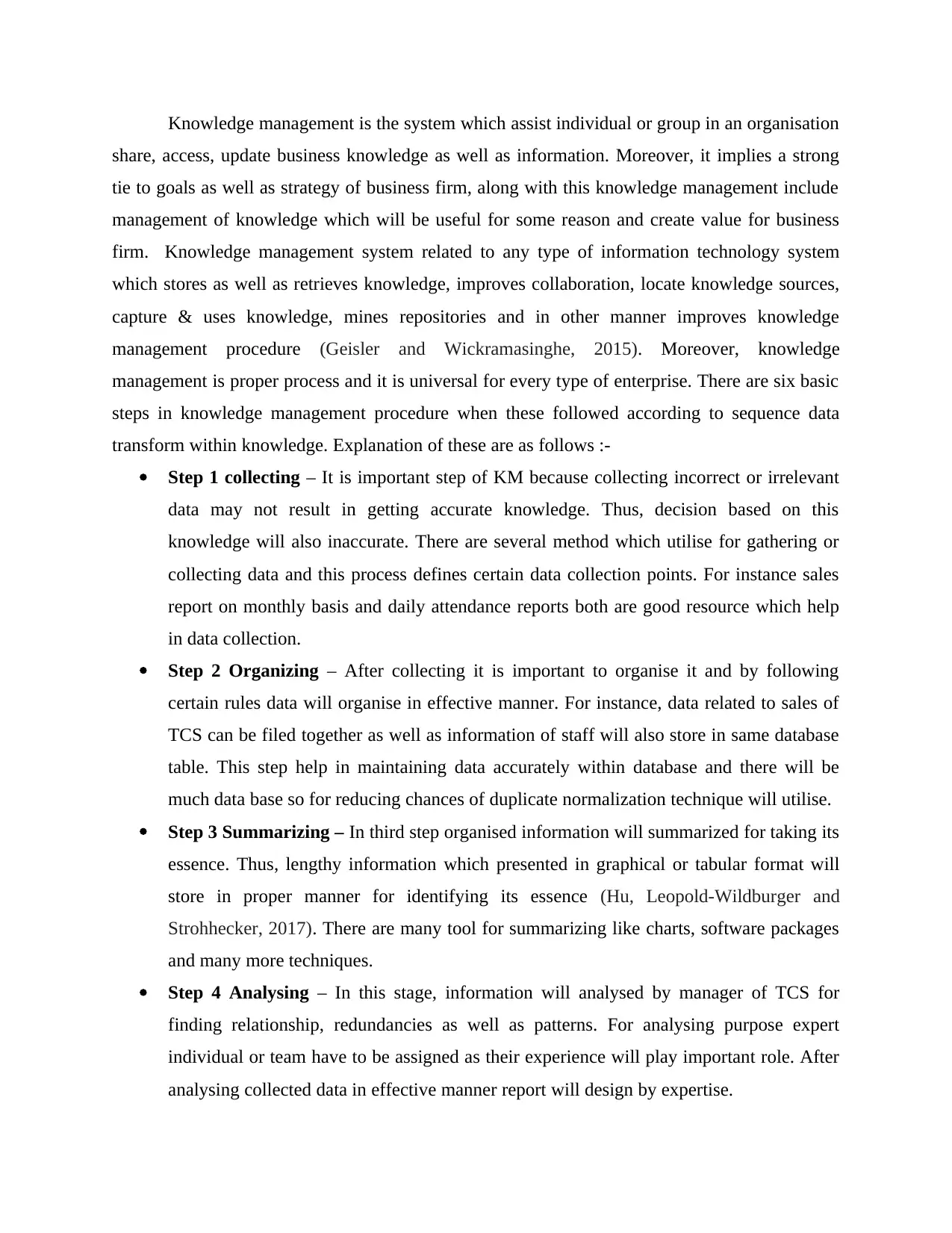
Knowledge management is the system which assist individual or group in an organisation
share, access, update business knowledge as well as information. Moreover, it implies a strong
tie to goals as well as strategy of business firm, along with this knowledge management include
management of knowledge which will be useful for some reason and create value for business
firm. Knowledge management system related to any type of information technology system
which stores as well as retrieves knowledge, improves collaboration, locate knowledge sources,
capture & uses knowledge, mines repositories and in other manner improves knowledge
management procedure (Geisler and Wickramasinghe, 2015). Moreover, knowledge
management is proper process and it is universal for every type of enterprise. There are six basic
steps in knowledge management procedure when these followed according to sequence data
transform within knowledge. Explanation of these are as follows :-
Step 1 collecting – It is important step of KM because collecting incorrect or irrelevant
data may not result in getting accurate knowledge. Thus, decision based on this
knowledge will also inaccurate. There are several method which utilise for gathering or
collecting data and this process defines certain data collection points. For instance sales
report on monthly basis and daily attendance reports both are good resource which help
in data collection.
Step 2 Organizing – After collecting it is important to organise it and by following
certain rules data will organise in effective manner. For instance, data related to sales of
TCS can be filed together as well as information of staff will also store in same database
table. This step help in maintaining data accurately within database and there will be
much data base so for reducing chances of duplicate normalization technique will utilise.
Step 3 Summarizing – In third step organised information will summarized for taking its
essence. Thus, lengthy information which presented in graphical or tabular format will
store in proper manner for identifying its essence (Hu, Leopold-Wildburger and
Strohhecker, 2017). There are many tool for summarizing like charts, software packages
and many more techniques.
Step 4 Analysing – In this stage, information will analysed by manager of TCS for
finding relationship, redundancies as well as patterns. For analysing purpose expert
individual or team have to be assigned as their experience will play important role. After
analysing collected data in effective manner report will design by expertise.
share, access, update business knowledge as well as information. Moreover, it implies a strong
tie to goals as well as strategy of business firm, along with this knowledge management include
management of knowledge which will be useful for some reason and create value for business
firm. Knowledge management system related to any type of information technology system
which stores as well as retrieves knowledge, improves collaboration, locate knowledge sources,
capture & uses knowledge, mines repositories and in other manner improves knowledge
management procedure (Geisler and Wickramasinghe, 2015). Moreover, knowledge
management is proper process and it is universal for every type of enterprise. There are six basic
steps in knowledge management procedure when these followed according to sequence data
transform within knowledge. Explanation of these are as follows :-
Step 1 collecting – It is important step of KM because collecting incorrect or irrelevant
data may not result in getting accurate knowledge. Thus, decision based on this
knowledge will also inaccurate. There are several method which utilise for gathering or
collecting data and this process defines certain data collection points. For instance sales
report on monthly basis and daily attendance reports both are good resource which help
in data collection.
Step 2 Organizing – After collecting it is important to organise it and by following
certain rules data will organise in effective manner. For instance, data related to sales of
TCS can be filed together as well as information of staff will also store in same database
table. This step help in maintaining data accurately within database and there will be
much data base so for reducing chances of duplicate normalization technique will utilise.
Step 3 Summarizing – In third step organised information will summarized for taking its
essence. Thus, lengthy information which presented in graphical or tabular format will
store in proper manner for identifying its essence (Hu, Leopold-Wildburger and
Strohhecker, 2017). There are many tool for summarizing like charts, software packages
and many more techniques.
Step 4 Analysing – In this stage, information will analysed by manager of TCS for
finding relationship, redundancies as well as patterns. For analysing purpose expert
individual or team have to be assigned as their experience will play important role. After
analysing collected data in effective manner report will design by expertise.
Paraphrase This Document
Need a fresh take? Get an instant paraphrase of this document with our AI Paraphraser
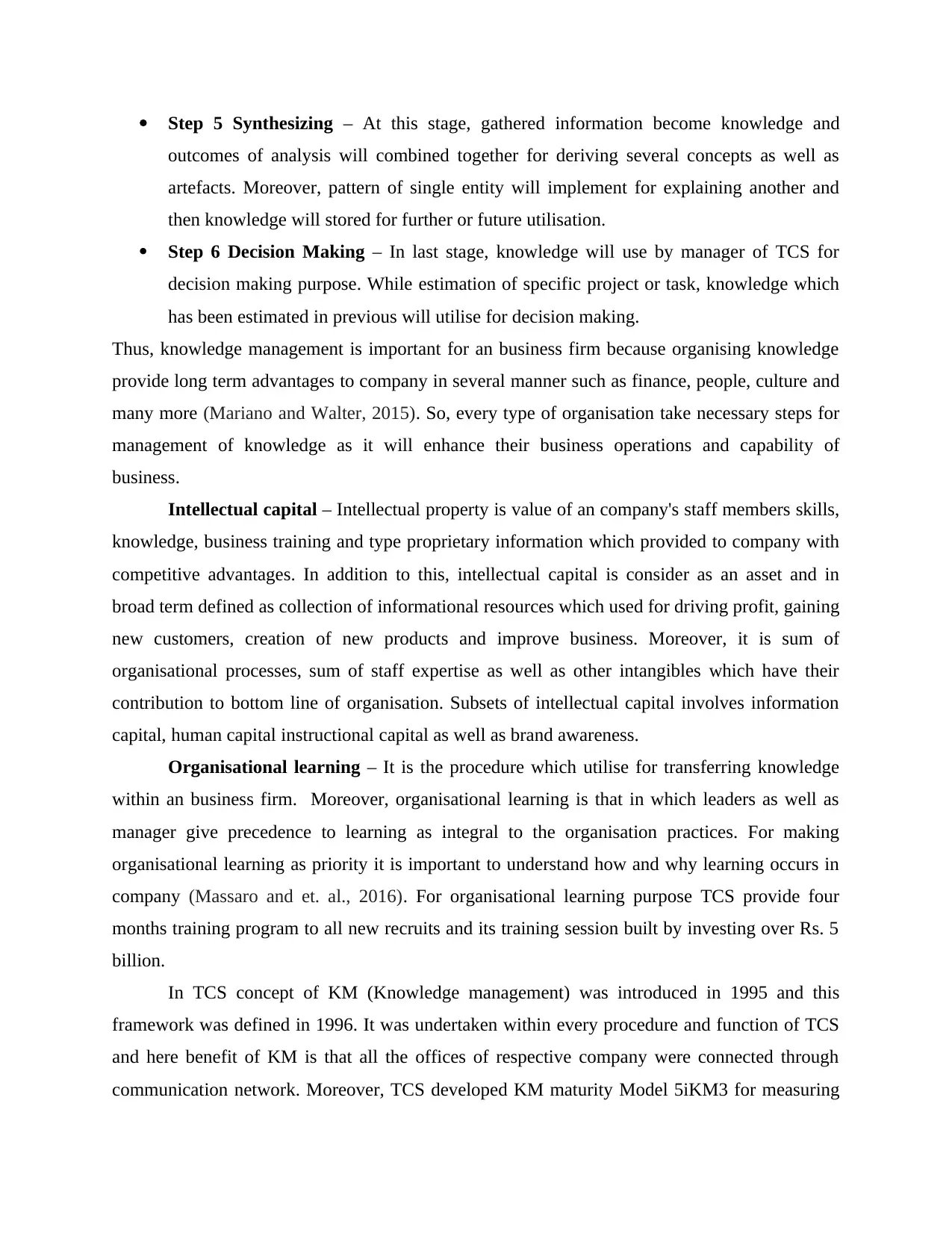
Step 5 Synthesizing – At this stage, gathered information become knowledge and
outcomes of analysis will combined together for deriving several concepts as well as
artefacts. Moreover, pattern of single entity will implement for explaining another and
then knowledge will stored for further or future utilisation.
Step 6 Decision Making – In last stage, knowledge will use by manager of TCS for
decision making purpose. While estimation of specific project or task, knowledge which
has been estimated in previous will utilise for decision making.
Thus, knowledge management is important for an business firm because organising knowledge
provide long term advantages to company in several manner such as finance, people, culture and
many more (Mariano and Walter, 2015). So, every type of organisation take necessary steps for
management of knowledge as it will enhance their business operations and capability of
business.
Intellectual capital – Intellectual property is value of an company's staff members skills,
knowledge, business training and type proprietary information which provided to company with
competitive advantages. In addition to this, intellectual capital is consider as an asset and in
broad term defined as collection of informational resources which used for driving profit, gaining
new customers, creation of new products and improve business. Moreover, it is sum of
organisational processes, sum of staff expertise as well as other intangibles which have their
contribution to bottom line of organisation. Subsets of intellectual capital involves information
capital, human capital instructional capital as well as brand awareness.
Organisational learning – It is the procedure which utilise for transferring knowledge
within an business firm. Moreover, organisational learning is that in which leaders as well as
manager give precedence to learning as integral to the organisation practices. For making
organisational learning as priority it is important to understand how and why learning occurs in
company (Massaro and et. al., 2016). For organisational learning purpose TCS provide four
months training program to all new recruits and its training session built by investing over Rs. 5
billion.
In TCS concept of KM (Knowledge management) was introduced in 1995 and this
framework was defined in 1996. It was undertaken within every procedure and function of TCS
and here benefit of KM is that all the offices of respective company were connected through
communication network. Moreover, TCS developed KM maturity Model 5iKM3 for measuring
outcomes of analysis will combined together for deriving several concepts as well as
artefacts. Moreover, pattern of single entity will implement for explaining another and
then knowledge will stored for further or future utilisation.
Step 6 Decision Making – In last stage, knowledge will use by manager of TCS for
decision making purpose. While estimation of specific project or task, knowledge which
has been estimated in previous will utilise for decision making.
Thus, knowledge management is important for an business firm because organising knowledge
provide long term advantages to company in several manner such as finance, people, culture and
many more (Mariano and Walter, 2015). So, every type of organisation take necessary steps for
management of knowledge as it will enhance their business operations and capability of
business.
Intellectual capital – Intellectual property is value of an company's staff members skills,
knowledge, business training and type proprietary information which provided to company with
competitive advantages. In addition to this, intellectual capital is consider as an asset and in
broad term defined as collection of informational resources which used for driving profit, gaining
new customers, creation of new products and improve business. Moreover, it is sum of
organisational processes, sum of staff expertise as well as other intangibles which have their
contribution to bottom line of organisation. Subsets of intellectual capital involves information
capital, human capital instructional capital as well as brand awareness.
Organisational learning – It is the procedure which utilise for transferring knowledge
within an business firm. Moreover, organisational learning is that in which leaders as well as
manager give precedence to learning as integral to the organisation practices. For making
organisational learning as priority it is important to understand how and why learning occurs in
company (Massaro and et. al., 2016). For organisational learning purpose TCS provide four
months training program to all new recruits and its training session built by investing over Rs. 5
billion.
In TCS concept of KM (Knowledge management) was introduced in 1995 and this
framework was defined in 1996. It was undertaken within every procedure and function of TCS
and here benefit of KM is that all the offices of respective company were connected through
communication network. Moreover, TCS developed KM maturity Model 5iKM3 for measuring
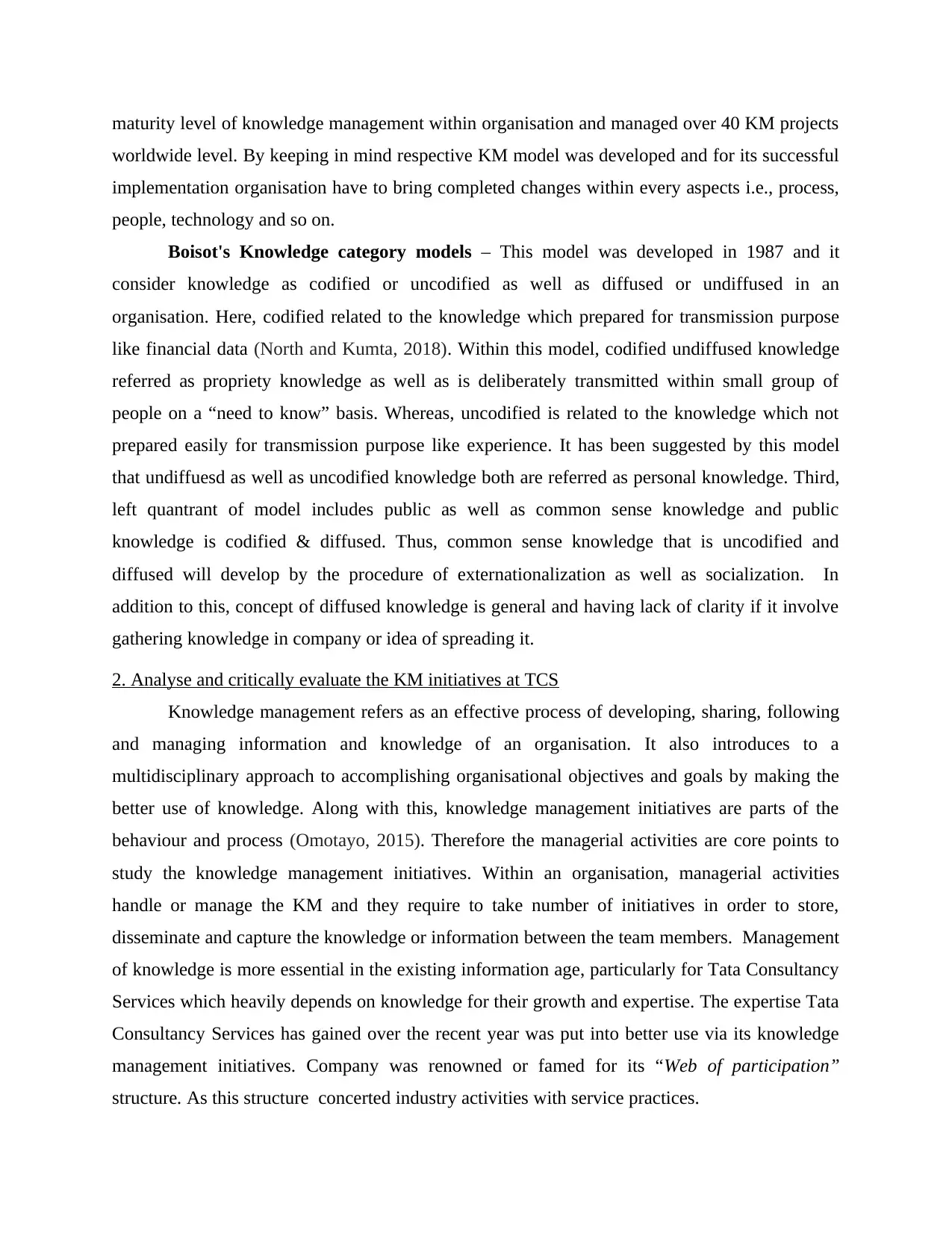
maturity level of knowledge management within organisation and managed over 40 KM projects
worldwide level. By keeping in mind respective KM model was developed and for its successful
implementation organisation have to bring completed changes within every aspects i.e., process,
people, technology and so on.
Boisot's Knowledge category models – This model was developed in 1987 and it
consider knowledge as codified or uncodified as well as diffused or undiffused in an
organisation. Here, codified related to the knowledge which prepared for transmission purpose
like financial data (North and Kumta, 2018). Within this model, codified undiffused knowledge
referred as propriety knowledge as well as is deliberately transmitted within small group of
people on a “need to know” basis. Whereas, uncodified is related to the knowledge which not
prepared easily for transmission purpose like experience. It has been suggested by this model
that undiffuesd as well as uncodified knowledge both are referred as personal knowledge. Third,
left quantrant of model includes public as well as common sense knowledge and public
knowledge is codified & diffused. Thus, common sense knowledge that is uncodified and
diffused will develop by the procedure of externationalization as well as socialization. In
addition to this, concept of diffused knowledge is general and having lack of clarity if it involve
gathering knowledge in company or idea of spreading it.
2. Analyse and critically evaluate the KM initiatives at TCS
Knowledge management refers as an effective process of developing, sharing, following
and managing information and knowledge of an organisation. It also introduces to a
multidisciplinary approach to accomplishing organisational objectives and goals by making the
better use of knowledge. Along with this, knowledge management initiatives are parts of the
behaviour and process (Omotayo, 2015). Therefore the managerial activities are core points to
study the knowledge management initiatives. Within an organisation, managerial activities
handle or manage the KM and they require to take number of initiatives in order to store,
disseminate and capture the knowledge or information between the team members. Management
of knowledge is more essential in the existing information age, particularly for Tata Consultancy
Services which heavily depends on knowledge for their growth and expertise. The expertise Tata
Consultancy Services has gained over the recent year was put into better use via its knowledge
management initiatives. Company was renowned or famed for its “Web of participation”
structure. As this structure concerted industry activities with service practices.
worldwide level. By keeping in mind respective KM model was developed and for its successful
implementation organisation have to bring completed changes within every aspects i.e., process,
people, technology and so on.
Boisot's Knowledge category models – This model was developed in 1987 and it
consider knowledge as codified or uncodified as well as diffused or undiffused in an
organisation. Here, codified related to the knowledge which prepared for transmission purpose
like financial data (North and Kumta, 2018). Within this model, codified undiffused knowledge
referred as propriety knowledge as well as is deliberately transmitted within small group of
people on a “need to know” basis. Whereas, uncodified is related to the knowledge which not
prepared easily for transmission purpose like experience. It has been suggested by this model
that undiffuesd as well as uncodified knowledge both are referred as personal knowledge. Third,
left quantrant of model includes public as well as common sense knowledge and public
knowledge is codified & diffused. Thus, common sense knowledge that is uncodified and
diffused will develop by the procedure of externationalization as well as socialization. In
addition to this, concept of diffused knowledge is general and having lack of clarity if it involve
gathering knowledge in company or idea of spreading it.
2. Analyse and critically evaluate the KM initiatives at TCS
Knowledge management refers as an effective process of developing, sharing, following
and managing information and knowledge of an organisation. It also introduces to a
multidisciplinary approach to accomplishing organisational objectives and goals by making the
better use of knowledge. Along with this, knowledge management initiatives are parts of the
behaviour and process (Omotayo, 2015). Therefore the managerial activities are core points to
study the knowledge management initiatives. Within an organisation, managerial activities
handle or manage the KM and they require to take number of initiatives in order to store,
disseminate and capture the knowledge or information between the team members. Management
of knowledge is more essential in the existing information age, particularly for Tata Consultancy
Services which heavily depends on knowledge for their growth and expertise. The expertise Tata
Consultancy Services has gained over the recent year was put into better use via its knowledge
management initiatives. Company was renowned or famed for its “Web of participation”
structure. As this structure concerted industry activities with service practices.
⊘ This is a preview!⊘
Do you want full access?
Subscribe today to unlock all pages.

Trusted by 1+ million students worldwide
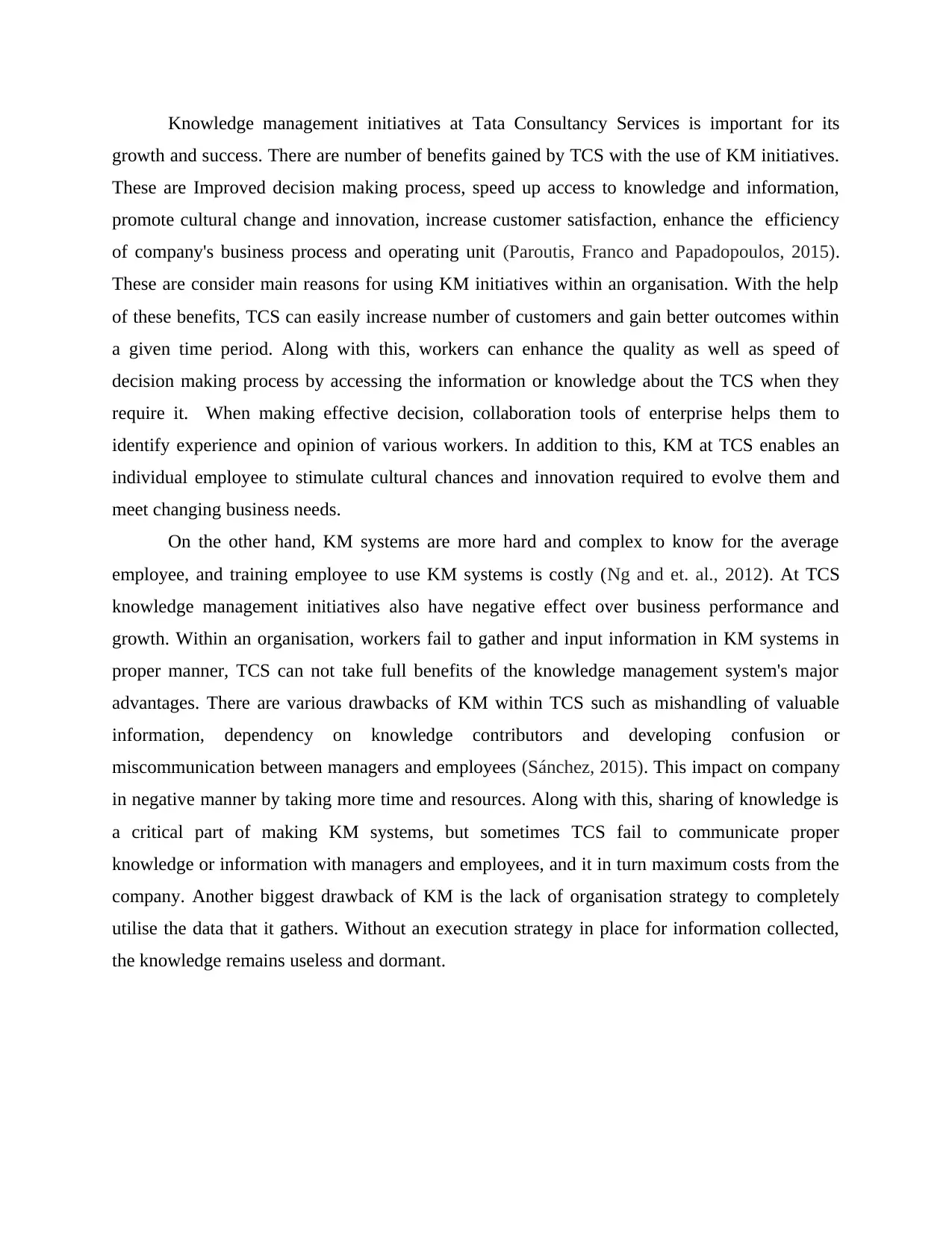
Knowledge management initiatives at Tata Consultancy Services is important for its
growth and success. There are number of benefits gained by TCS with the use of KM initiatives.
These are Improved decision making process, speed up access to knowledge and information,
promote cultural change and innovation, increase customer satisfaction, enhance the efficiency
of company's business process and operating unit (Paroutis, Franco and Papadopoulos, 2015).
These are consider main reasons for using KM initiatives within an organisation. With the help
of these benefits, TCS can easily increase number of customers and gain better outcomes within
a given time period. Along with this, workers can enhance the quality as well as speed of
decision making process by accessing the information or knowledge about the TCS when they
require it. When making effective decision, collaboration tools of enterprise helps them to
identify experience and opinion of various workers. In addition to this, KM at TCS enables an
individual employee to stimulate cultural chances and innovation required to evolve them and
meet changing business needs.
On the other hand, KM systems are more hard and complex to know for the average
employee, and training employee to use KM systems is costly (Ng and et. al., 2012). At TCS
knowledge management initiatives also have negative effect over business performance and
growth. Within an organisation, workers fail to gather and input information in KM systems in
proper manner, TCS can not take full benefits of the knowledge management system's major
advantages. There are various drawbacks of KM within TCS such as mishandling of valuable
information, dependency on knowledge contributors and developing confusion or
miscommunication between managers and employees (Sánchez, 2015). This impact on company
in negative manner by taking more time and resources. Along with this, sharing of knowledge is
a critical part of making KM systems, but sometimes TCS fail to communicate proper
knowledge or information with managers and employees, and it in turn maximum costs from the
company. Another biggest drawback of KM is the lack of organisation strategy to completely
utilise the data that it gathers. Without an execution strategy in place for information collected,
the knowledge remains useless and dormant.
growth and success. There are number of benefits gained by TCS with the use of KM initiatives.
These are Improved decision making process, speed up access to knowledge and information,
promote cultural change and innovation, increase customer satisfaction, enhance the efficiency
of company's business process and operating unit (Paroutis, Franco and Papadopoulos, 2015).
These are consider main reasons for using KM initiatives within an organisation. With the help
of these benefits, TCS can easily increase number of customers and gain better outcomes within
a given time period. Along with this, workers can enhance the quality as well as speed of
decision making process by accessing the information or knowledge about the TCS when they
require it. When making effective decision, collaboration tools of enterprise helps them to
identify experience and opinion of various workers. In addition to this, KM at TCS enables an
individual employee to stimulate cultural chances and innovation required to evolve them and
meet changing business needs.
On the other hand, KM systems are more hard and complex to know for the average
employee, and training employee to use KM systems is costly (Ng and et. al., 2012). At TCS
knowledge management initiatives also have negative effect over business performance and
growth. Within an organisation, workers fail to gather and input information in KM systems in
proper manner, TCS can not take full benefits of the knowledge management system's major
advantages. There are various drawbacks of KM within TCS such as mishandling of valuable
information, dependency on knowledge contributors and developing confusion or
miscommunication between managers and employees (Sánchez, 2015). This impact on company
in negative manner by taking more time and resources. Along with this, sharing of knowledge is
a critical part of making KM systems, but sometimes TCS fail to communicate proper
knowledge or information with managers and employees, and it in turn maximum costs from the
company. Another biggest drawback of KM is the lack of organisation strategy to completely
utilise the data that it gathers. Without an execution strategy in place for information collected,
the knowledge remains useless and dormant.
Paraphrase This Document
Need a fresh take? Get an instant paraphrase of this document with our AI Paraphraser
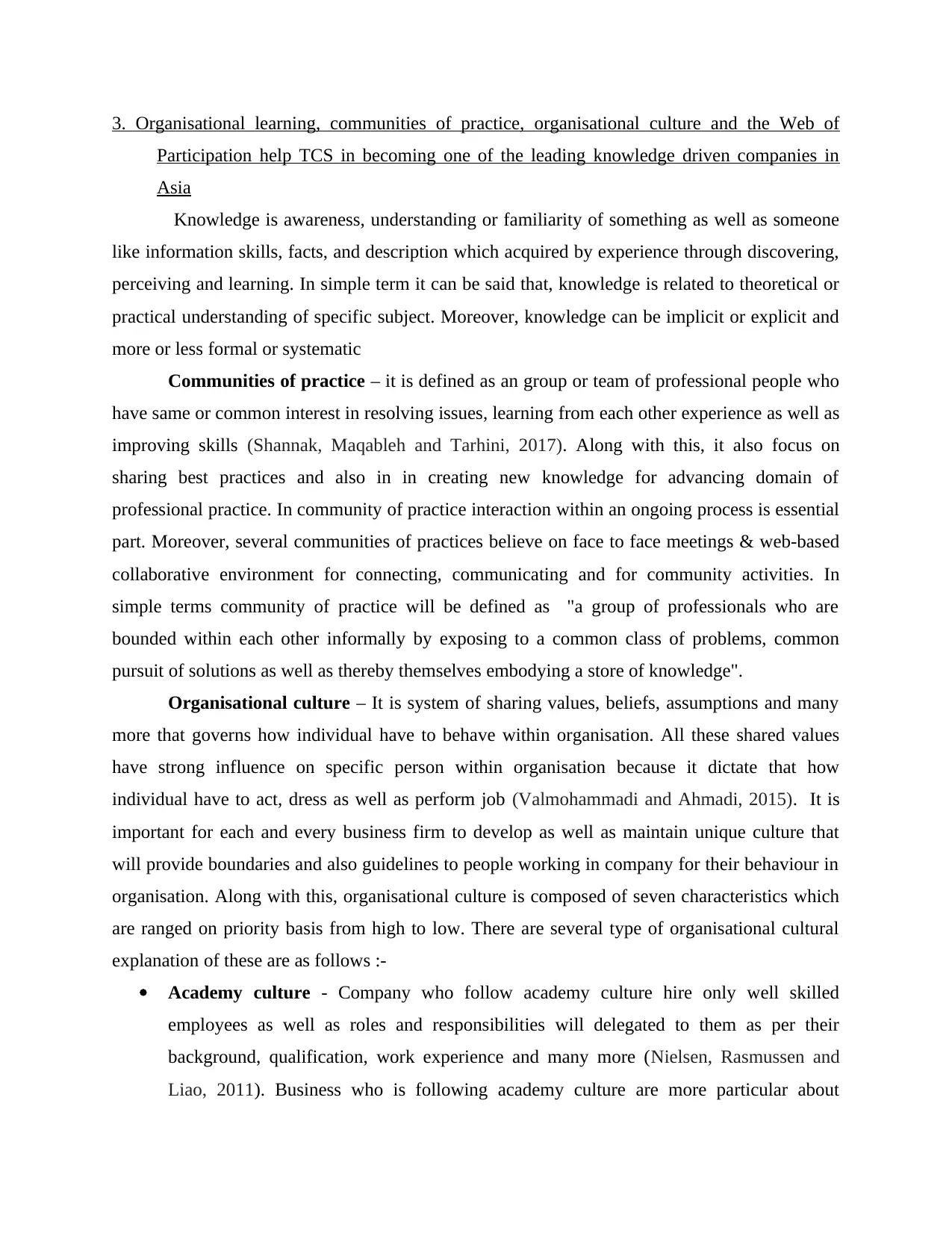
3. Organisational learning, communities of practice, organisational culture and the Web of
Participation help TCS in becoming one of the leading knowledge driven companies in
Asia
Knowledge is awareness, understanding or familiarity of something as well as someone
like information skills, facts, and description which acquired by experience through discovering,
perceiving and learning. In simple term it can be said that, knowledge is related to theoretical or
practical understanding of specific subject. Moreover, knowledge can be implicit or explicit and
more or less formal or systematic
Communities of practice – it is defined as an group or team of professional people who
have same or common interest in resolving issues, learning from each other experience as well as
improving skills (Shannak, Maqableh and Tarhini, 2017). Along with this, it also focus on
sharing best practices and also in in creating new knowledge for advancing domain of
professional practice. In community of practice interaction within an ongoing process is essential
part. Moreover, several communities of practices believe on face to face meetings & web-based
collaborative environment for connecting, communicating and for community activities. In
simple terms community of practice will be defined as "a group of professionals who are
bounded within each other informally by exposing to a common class of problems, common
pursuit of solutions as well as thereby themselves embodying a store of knowledge".
Organisational culture – It is system of sharing values, beliefs, assumptions and many
more that governs how individual have to behave within organisation. All these shared values
have strong influence on specific person within organisation because it dictate that how
individual have to act, dress as well as perform job (Valmohammadi and Ahmadi, 2015). It is
important for each and every business firm to develop as well as maintain unique culture that
will provide boundaries and also guidelines to people working in company for their behaviour in
organisation. Along with this, organisational culture is composed of seven characteristics which
are ranged on priority basis from high to low. There are several type of organisational cultural
explanation of these are as follows :-
Academy culture - Company who follow academy culture hire only well skilled
employees as well as roles and responsibilities will delegated to them as per their
background, qualification, work experience and many more (Nielsen, Rasmussen and
Liao, 2011). Business who is following academy culture are more particular about
Participation help TCS in becoming one of the leading knowledge driven companies in
Asia
Knowledge is awareness, understanding or familiarity of something as well as someone
like information skills, facts, and description which acquired by experience through discovering,
perceiving and learning. In simple term it can be said that, knowledge is related to theoretical or
practical understanding of specific subject. Moreover, knowledge can be implicit or explicit and
more or less formal or systematic
Communities of practice – it is defined as an group or team of professional people who
have same or common interest in resolving issues, learning from each other experience as well as
improving skills (Shannak, Maqableh and Tarhini, 2017). Along with this, it also focus on
sharing best practices and also in in creating new knowledge for advancing domain of
professional practice. In community of practice interaction within an ongoing process is essential
part. Moreover, several communities of practices believe on face to face meetings & web-based
collaborative environment for connecting, communicating and for community activities. In
simple terms community of practice will be defined as "a group of professionals who are
bounded within each other informally by exposing to a common class of problems, common
pursuit of solutions as well as thereby themselves embodying a store of knowledge".
Organisational culture – It is system of sharing values, beliefs, assumptions and many
more that governs how individual have to behave within organisation. All these shared values
have strong influence on specific person within organisation because it dictate that how
individual have to act, dress as well as perform job (Valmohammadi and Ahmadi, 2015). It is
important for each and every business firm to develop as well as maintain unique culture that
will provide boundaries and also guidelines to people working in company for their behaviour in
organisation. Along with this, organisational culture is composed of seven characteristics which
are ranged on priority basis from high to low. There are several type of organisational cultural
explanation of these are as follows :-
Academy culture - Company who follow academy culture hire only well skilled
employees as well as roles and responsibilities will delegated to them as per their
background, qualification, work experience and many more (Nielsen, Rasmussen and
Liao, 2011). Business who is following academy culture are more particular about
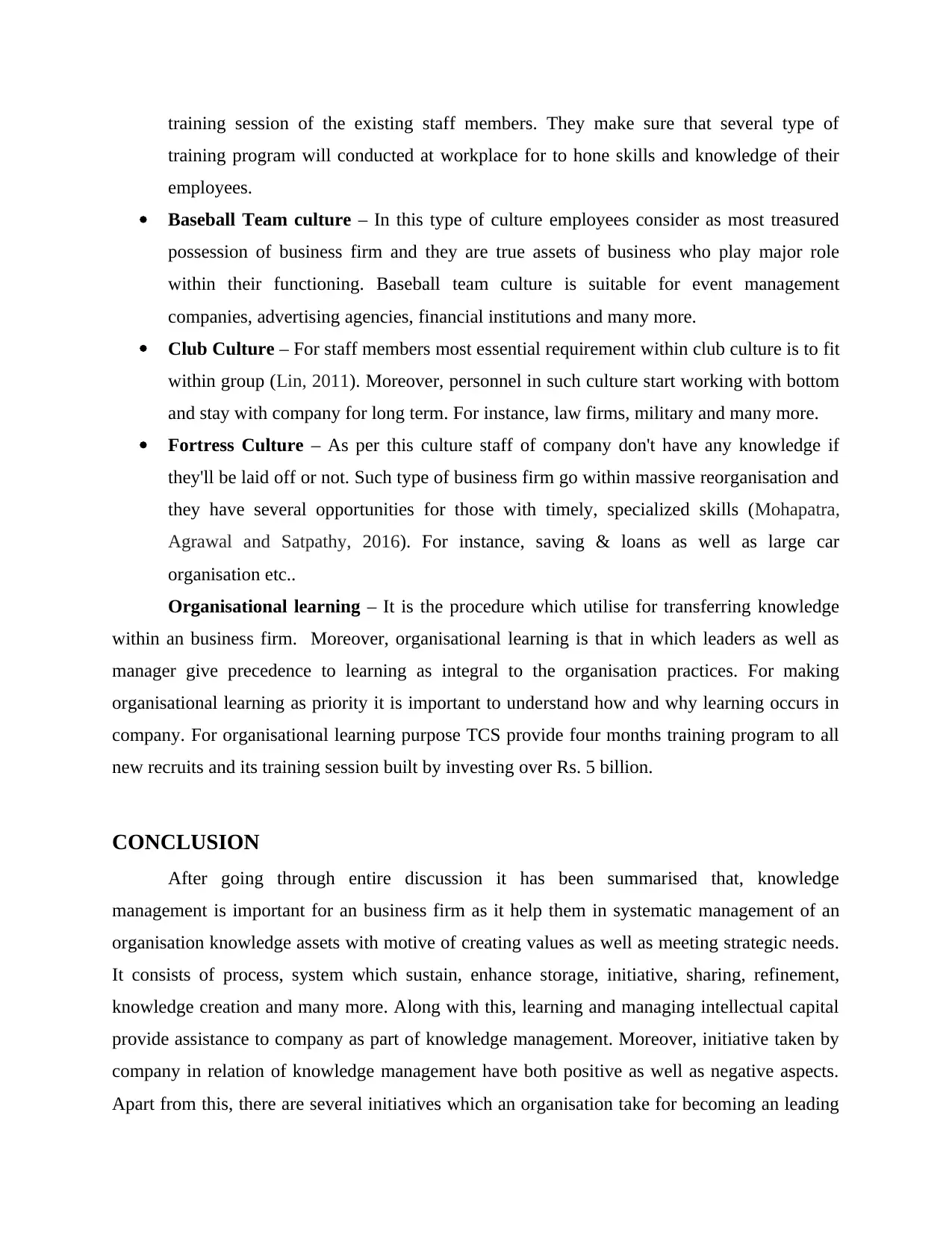
training session of the existing staff members. They make sure that several type of
training program will conducted at workplace for to hone skills and knowledge of their
employees.
Baseball Team culture – In this type of culture employees consider as most treasured
possession of business firm and they are true assets of business who play major role
within their functioning. Baseball team culture is suitable for event management
companies, advertising agencies, financial institutions and many more.
Club Culture – For staff members most essential requirement within club culture is to fit
within group (Lin, 2011). Moreover, personnel in such culture start working with bottom
and stay with company for long term. For instance, law firms, military and many more.
Fortress Culture – As per this culture staff of company don't have any knowledge if
they'll be laid off or not. Such type of business firm go within massive reorganisation and
they have several opportunities for those with timely, specialized skills (Mohapatra,
Agrawal and Satpathy, 2016). For instance, saving & loans as well as large car
organisation etc..
Organisational learning – It is the procedure which utilise for transferring knowledge
within an business firm. Moreover, organisational learning is that in which leaders as well as
manager give precedence to learning as integral to the organisation practices. For making
organisational learning as priority it is important to understand how and why learning occurs in
company. For organisational learning purpose TCS provide four months training program to all
new recruits and its training session built by investing over Rs. 5 billion.
CONCLUSION
After going through entire discussion it has been summarised that, knowledge
management is important for an business firm as it help them in systematic management of an
organisation knowledge assets with motive of creating values as well as meeting strategic needs.
It consists of process, system which sustain, enhance storage, initiative, sharing, refinement,
knowledge creation and many more. Along with this, learning and managing intellectual capital
provide assistance to company as part of knowledge management. Moreover, initiative taken by
company in relation of knowledge management have both positive as well as negative aspects.
Apart from this, there are several initiatives which an organisation take for becoming an leading
training program will conducted at workplace for to hone skills and knowledge of their
employees.
Baseball Team culture – In this type of culture employees consider as most treasured
possession of business firm and they are true assets of business who play major role
within their functioning. Baseball team culture is suitable for event management
companies, advertising agencies, financial institutions and many more.
Club Culture – For staff members most essential requirement within club culture is to fit
within group (Lin, 2011). Moreover, personnel in such culture start working with bottom
and stay with company for long term. For instance, law firms, military and many more.
Fortress Culture – As per this culture staff of company don't have any knowledge if
they'll be laid off or not. Such type of business firm go within massive reorganisation and
they have several opportunities for those with timely, specialized skills (Mohapatra,
Agrawal and Satpathy, 2016). For instance, saving & loans as well as large car
organisation etc..
Organisational learning – It is the procedure which utilise for transferring knowledge
within an business firm. Moreover, organisational learning is that in which leaders as well as
manager give precedence to learning as integral to the organisation practices. For making
organisational learning as priority it is important to understand how and why learning occurs in
company. For organisational learning purpose TCS provide four months training program to all
new recruits and its training session built by investing over Rs. 5 billion.
CONCLUSION
After going through entire discussion it has been summarised that, knowledge
management is important for an business firm as it help them in systematic management of an
organisation knowledge assets with motive of creating values as well as meeting strategic needs.
It consists of process, system which sustain, enhance storage, initiative, sharing, refinement,
knowledge creation and many more. Along with this, learning and managing intellectual capital
provide assistance to company as part of knowledge management. Moreover, initiative taken by
company in relation of knowledge management have both positive as well as negative aspects.
Apart from this, there are several initiatives which an organisation take for becoming an leading
⊘ This is a preview!⊘
Do you want full access?
Subscribe today to unlock all pages.

Trusted by 1+ million students worldwide
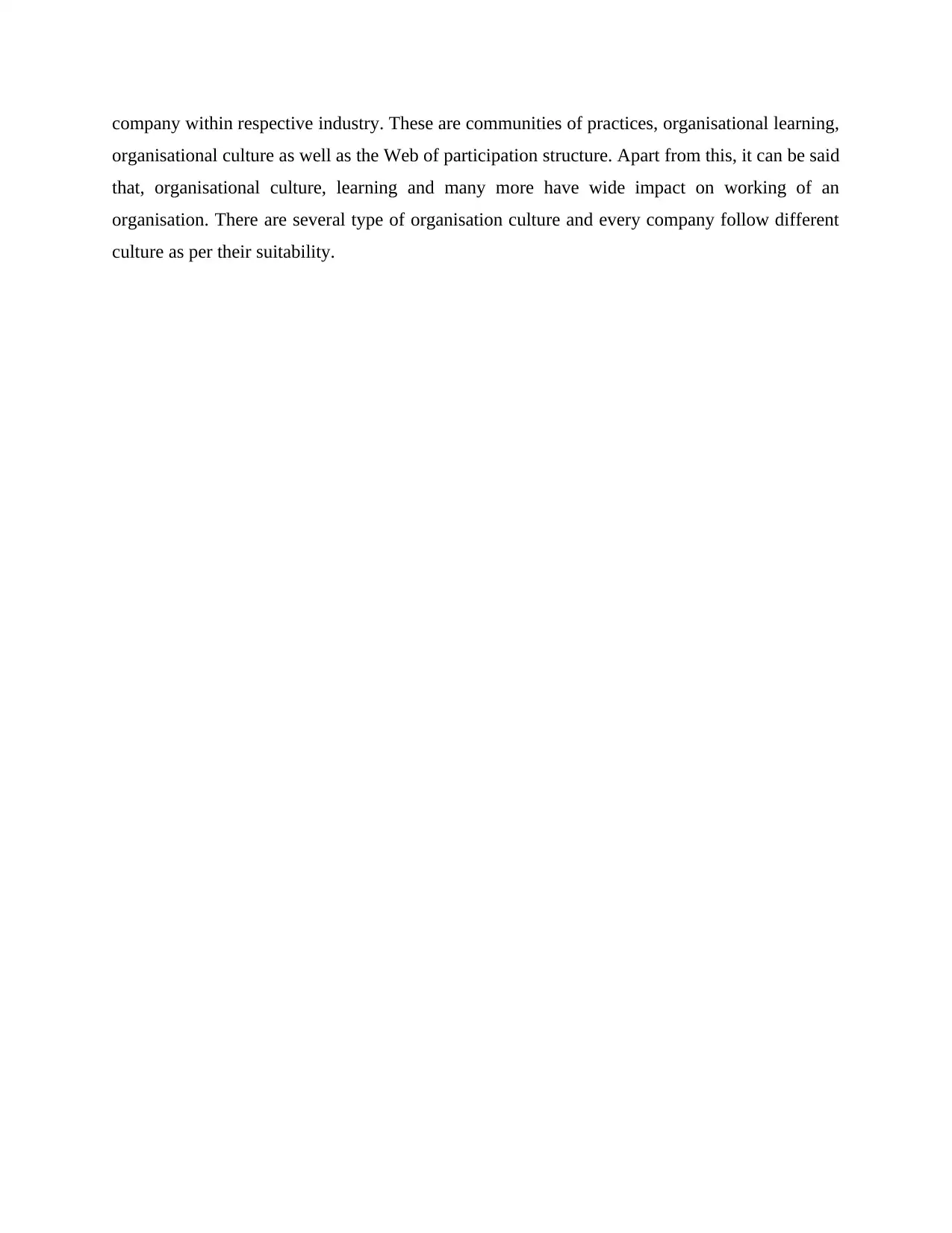
company within respective industry. These are communities of practices, organisational learning,
organisational culture as well as the Web of participation structure. Apart from this, it can be said
that, organisational culture, learning and many more have wide impact on working of an
organisation. There are several type of organisation culture and every company follow different
culture as per their suitability.
organisational culture as well as the Web of participation structure. Apart from this, it can be said
that, organisational culture, learning and many more have wide impact on working of an
organisation. There are several type of organisation culture and every company follow different
culture as per their suitability.
Paraphrase This Document
Need a fresh take? Get an instant paraphrase of this document with our AI Paraphraser
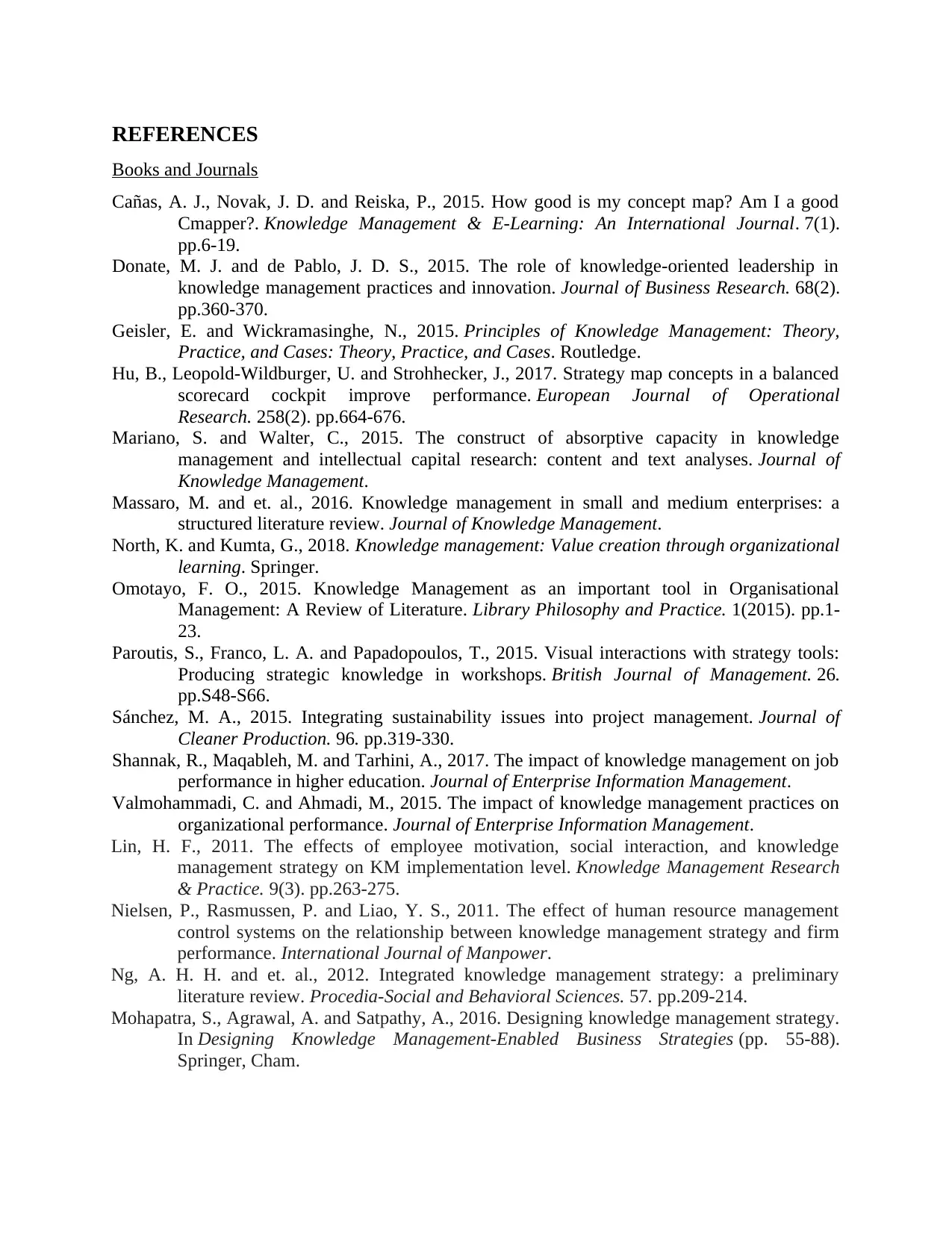
REFERENCES
Books and Journals
Cañas, A. J., Novak, J. D. and Reiska, P., 2015. How good is my concept map? Am I a good
Cmapper?. Knowledge Management & E-Learning: An International Journal. 7(1).
pp.6-19.
Donate, M. J. and de Pablo, J. D. S., 2015. The role of knowledge-oriented leadership in
knowledge management practices and innovation. Journal of Business Research. 68(2).
pp.360-370.
Geisler, E. and Wickramasinghe, N., 2015. Principles of Knowledge Management: Theory,
Practice, and Cases: Theory, Practice, and Cases. Routledge.
Hu, B., Leopold-Wildburger, U. and Strohhecker, J., 2017. Strategy map concepts in a balanced
scorecard cockpit improve performance. European Journal of Operational
Research. 258(2). pp.664-676.
Mariano, S. and Walter, C., 2015. The construct of absorptive capacity in knowledge
management and intellectual capital research: content and text analyses. Journal of
Knowledge Management.
Massaro, M. and et. al., 2016. Knowledge management in small and medium enterprises: a
structured literature review. Journal of Knowledge Management.
North, K. and Kumta, G., 2018. Knowledge management: Value creation through organizational
learning. Springer.
Omotayo, F. O., 2015. Knowledge Management as an important tool in Organisational
Management: A Review of Literature. Library Philosophy and Practice. 1(2015). pp.1-
23.
Paroutis, S., Franco, L. A. and Papadopoulos, T., 2015. Visual interactions with strategy tools:
Producing strategic knowledge in workshops. British Journal of Management. 26.
pp.S48-S66.
Sánchez, M. A., 2015. Integrating sustainability issues into project management. Journal of
Cleaner Production. 96. pp.319-330.
Shannak, R., Maqableh, M. and Tarhini, A., 2017. The impact of knowledge management on job
performance in higher education. Journal of Enterprise Information Management.
Valmohammadi, C. and Ahmadi, M., 2015. The impact of knowledge management practices on
organizational performance. Journal of Enterprise Information Management.
Lin, H. F., 2011. The effects of employee motivation, social interaction, and knowledge
management strategy on KM implementation level. Knowledge Management Research
& Practice. 9(3). pp.263-275.
Nielsen, P., Rasmussen, P. and Liao, Y. S., 2011. The effect of human resource management
control systems on the relationship between knowledge management strategy and firm
performance. International Journal of Manpower.
Ng, A. H. H. and et. al., 2012. Integrated knowledge management strategy: a preliminary
literature review. Procedia-Social and Behavioral Sciences. 57. pp.209-214.
Mohapatra, S., Agrawal, A. and Satpathy, A., 2016. Designing knowledge management strategy.
In Designing Knowledge Management-Enabled Business Strategies (pp. 55-88).
Springer, Cham.
Books and Journals
Cañas, A. J., Novak, J. D. and Reiska, P., 2015. How good is my concept map? Am I a good
Cmapper?. Knowledge Management & E-Learning: An International Journal. 7(1).
pp.6-19.
Donate, M. J. and de Pablo, J. D. S., 2015. The role of knowledge-oriented leadership in
knowledge management practices and innovation. Journal of Business Research. 68(2).
pp.360-370.
Geisler, E. and Wickramasinghe, N., 2015. Principles of Knowledge Management: Theory,
Practice, and Cases: Theory, Practice, and Cases. Routledge.
Hu, B., Leopold-Wildburger, U. and Strohhecker, J., 2017. Strategy map concepts in a balanced
scorecard cockpit improve performance. European Journal of Operational
Research. 258(2). pp.664-676.
Mariano, S. and Walter, C., 2015. The construct of absorptive capacity in knowledge
management and intellectual capital research: content and text analyses. Journal of
Knowledge Management.
Massaro, M. and et. al., 2016. Knowledge management in small and medium enterprises: a
structured literature review. Journal of Knowledge Management.
North, K. and Kumta, G., 2018. Knowledge management: Value creation through organizational
learning. Springer.
Omotayo, F. O., 2015. Knowledge Management as an important tool in Organisational
Management: A Review of Literature. Library Philosophy and Practice. 1(2015). pp.1-
23.
Paroutis, S., Franco, L. A. and Papadopoulos, T., 2015. Visual interactions with strategy tools:
Producing strategic knowledge in workshops. British Journal of Management. 26.
pp.S48-S66.
Sánchez, M. A., 2015. Integrating sustainability issues into project management. Journal of
Cleaner Production. 96. pp.319-330.
Shannak, R., Maqableh, M. and Tarhini, A., 2017. The impact of knowledge management on job
performance in higher education. Journal of Enterprise Information Management.
Valmohammadi, C. and Ahmadi, M., 2015. The impact of knowledge management practices on
organizational performance. Journal of Enterprise Information Management.
Lin, H. F., 2011. The effects of employee motivation, social interaction, and knowledge
management strategy on KM implementation level. Knowledge Management Research
& Practice. 9(3). pp.263-275.
Nielsen, P., Rasmussen, P. and Liao, Y. S., 2011. The effect of human resource management
control systems on the relationship between knowledge management strategy and firm
performance. International Journal of Manpower.
Ng, A. H. H. and et. al., 2012. Integrated knowledge management strategy: a preliminary
literature review. Procedia-Social and Behavioral Sciences. 57. pp.209-214.
Mohapatra, S., Agrawal, A. and Satpathy, A., 2016. Designing knowledge management strategy.
In Designing Knowledge Management-Enabled Business Strategies (pp. 55-88).
Springer, Cham.

⊘ This is a preview!⊘
Do you want full access?
Subscribe today to unlock all pages.

Trusted by 1+ million students worldwide
1 out of 12
Related Documents
Your All-in-One AI-Powered Toolkit for Academic Success.
+13062052269
info@desklib.com
Available 24*7 on WhatsApp / Email
![[object Object]](/_next/static/media/star-bottom.7253800d.svg)
Unlock your academic potential
Copyright © 2020–2026 A2Z Services. All Rights Reserved. Developed and managed by ZUCOL.





